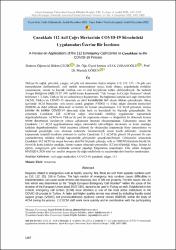Çanakkale 112 Acil Çağrı Merkezinin Covid-19 sürecindeki uygulamaları üzerine bir inceleme
Citation
Çelik, D. , Atak Çobanoğlu, Ş. & Görün, M. (2022). Çanakkale 112 Acil Çağrı Merkezinin COVID-19 Sürecindeki Uygulamaları Üzerine Bir İnceleme . Afyon Kocatepe Üniversitesi Sosyal Bilimler Dergisi , 24 (4) , 1467-1483 . DOI: 10.32709/akusosbil.1033581Abstract
Türkiye‟de sağlık, güvenlik, yangın, sel gibi acil durumlara iliĢkin talepler 110, 112, 155, 156 gibi ayrı numaralardan iletilmekteydi. Acil yardım numaralarının sayıca fazla olması, uygulamada zorluklar yaĢanmasına; zaman ve kaynak israfına, can ve mal kayıplarına neden olabilmekteydi. Bu nedenle Avrupa Birliği‟nin (AB) 29.07.1991 tarihli kararı kapsamında “Tek Avrupa Acil Çağrı Numarası” olarak belirlenen 112 hattı, Türkiye‟de de kullanılmaya baĢlanmıĢtır. Bu bağlamda kurulan acil çağrı merkezleri (AÇM), Türkiye‟de COVID-19 sürecinde en aktif kurumlardan biri olarak dikkati çekmektedir. Süreç içerisinde AÇM bünyesine vefa sosyal destek grupları (VSDG) ve il/ilçe salgın denetim merkezleri (ĠSDEM) de dahil edilerek daha hızlı ve kaliteli bir hizmet amaçlanmıĢtır. 112 AÇM personeli, katılan birimler ile birlikte COVID-19 sürecinde daha hızlı ve koordineli bir biçimde çalıĢmaktadır. Bu çalıĢmada Çanakkale 112 AÇM‟nin salgın sürecindeki etkililiği uygulamalar kapsamında değerlendirilmiĢtir. AÇM‟lerin Türkiye‟de yeni bir yapılanma olması ve olağanüstü bir dönemde hizmet verme durumunun inceleniyor olması çalıĢmanın önemini oluĢturmaktadır. ÇalıĢmanın amacı ise Çanakkale 112 AÇM uygulamalarının salgın sürecindeki iĢlevselliğini incelemek ve kente sunduğu katkıları değerlendirmektir. Nitel araĢtırma yöntemi ile oluĢturulan araĢtırmada birey deneyiminin ve toplumsal gerçekliğin esas alınması nedeniyle fenomenolojik desen tercih edilmiĢtir. AraĢtırma kapsamında tesadüfi örneklem yöntemi ile seçilen Çanakkale 112 AÇM‟de görevli 18 personel ile yarı yapılandırılmıĢ mülakat tekniği kapsamında görüĢmeler gerçekleĢtirilmiĢtir. GörüĢmeler sonucunda Çanakkale 112 AÇM‟nin salgın boyunca aktif bir biçimde çalıĢtığı, vefa ve ĠSDEM birimlerin büyük bir özveri ile kente katkılar sunduğu, hizmet sunum sürecinde personelin 112‟nin bilinirliği, bütçe, hizmet içi eğitim, entegrasyon gibi konularda sorunlar yaĢadığı bulgularına ulaĢılmıĢtır. Elde edilen bulgular MAXQDA 2020 nitel veri analizi programı ile değerlendirilmiĢ ve araĢtırmaya dair öneriler sunulmuĢtur. Requests related to emergencies such as health, security, fire, flood are sent from separate numbers such as 110, 112, 155, 156 in Turkey. The high number of emergency help numbers causes difficulties in implementation; can cause waste of time and resources, loss of life and property. For this reason, the 112 line which was determined as the "Single European Emergency Call Number" within the scope of the decision of the European Union dated 29.07.1991, started to be used in Turkey as well. Established in this context, emergency call centers (ECM) draw attention as one of the most active institutions in the COVID-19 process in Turkey. A faster and higher quality service was aimed by including loyalty social support groups (VSDG) and provincial/district epidemic control centers (ISDEM) within the body of ACM during the process. 112 ECM staff work more quickly and in coordination with the participating units during the COVID-19 process. In this study, the effectiveness of Canakkale 112 ECM in the epidemic process was evaluated within the scope of applications. The importance of the study is that ECM‟s are a new structuring in Turkey and their state of service in an extraordinary period is being examined. The aim of the study is to examine the functionality of Çanakkale 112 MCH applications during the epidemic process and to evaluate their contributions to the city. The phenomenological design was preferred due to the fact that the individual experience and social reality were taken as the basis in the research, which was created with the qualitative research method. Within the scope of the research, interviews were conducted with 18 personnel working in Canakkale 112 ECM, selected by random sampling method, within the scope of semi-structured interview technique. As a result of the interviews, it was found that Çanakkale 112 ECM was working actively during the epidemic, the loyalty and ISDEM units made contributions to the city with great devotion, and the personnel had problems in terms of awareness of 112, budget, in-service training and integration during the service delivery process. The findings were evaluated with the MAXQDA 2020 qualitative data analysis program and suggestions for the research were presented.
Source
Afyon Kocatepe Üniversitesi Sosyal Bilimler DergisiVolume
24Issue
4URI
https://dergipark.org.tr/tr/pub/akusosbil/issue/74315/1033581https://hdl.handle.net/11630/10758
Collections
- Cilt 24 : Sayı 4 [25]



















